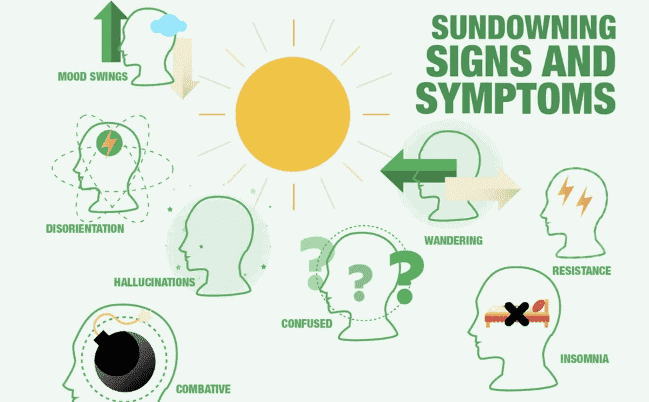Understanding and Managing Sundowning in Dementia: Ensuring Safety for Your Loved One
Published on April 17, 2024
Updated on January 17, 2025
Published on April 17, 2024
Updated on January 17, 2025

Table of Contents
Sundowning, or “late-day confusion,” is a challenging experience for individuals with dementia and their caregivers. This phenomenon, occurring in the late afternoon or evening, brings about increased confusion, anxiety, and agitation. Caregivers need to comprehend sundowning and offer compassionate care to ensure the well-being of their loved ones. This article delves into effective pharmacological and non-pharmacological strategies to manage sundowning and create a safe environment.
Sundowning is a problem that some people with dementia have. Dementia is a condition that affects the brain and makes it hard to remember things, think clearly, or do everyday tasks. Alzheimer’s disease is the most common type of dementia. Sundowning means that the person with dementia feels more confused, restless, or upset in the late afternoon or evening. They may pace around, wander away, or get angry. This can be scary or stressful for them and their family or caregivers. Sundowning happens because the person’s body clock is not working well. They may also be tired, hungry, thirsty, or overstimulated by noise or light.
We don’t know exactly what causes sundowning, but some things may make it more likely to happen. These include:
Sundowning can be different for each person with dementia. Some people may have it more often or more severely than others. Some people may have it only for a brief time or only in certain situations. Pay attention to what triggers or worsens sundowning for your loved one and try to avoid or reduce those factors.
Sundowning is when the person with dementia feels more confused or upset in the late afternoon or evening. They may pace around, wander away, or get angry. This can be scary or stressful for them and you. Here are some tips on how to reduce sundowning:
Sometimes, people with dementia may feel more confused or upset when the sun goes down. This is called sundowning. It can make them do things that are not safe, like wandering away or getting angry. You can help your loved one feel safer and calmer by following these tips:
Sundowning is a problem that some people with dementia have. It means they feel more confused or upset when the sun goes down. This can be hard for them and you, but you are not alone. You can do many things to help your loved one feel safer and calmer, such as keeping a routine, keeping the home well-lit, doing some calming activities, and talking to the doctor. You are doing a wonderful job of caring for your loved one with dementia. Remember to take care of yourself too. You deserve some rest and support. Thank you for reading this article; I hope you found it helpful.
Fighting Alzheimer’s From Sunrise to Sunset
Caregiver Training: Sundowning (video)
What is Sundowning? (video)
Sundowning: Late-day confusion
Understanding Dementia (Alzheimer’s & Vascular & Frontotemporal & Lewy Body Dementia) (Video)
How Do I Know Which Dementia I’m Looking At? (Video)
Dementia Training material (Free)
Promoting Meaningful Relationships with Dementia Patients through Validation Therapy
Unlocking the Power of Validation Therapy in Compassionate End-of-Life Care
Validation Therapy: A Valuable Tool for Families and Healthcare Teams
Best Practices for Approaching Combative Dementia Patients
Dementia Insights: The Validation Method for Dementia Care
As an Amazon Associate, I earn from qualifying purchases. The amount generated from these “qualifying purchases” helps to maintain this site.
As an Amazon Associate, I earn from qualifying purchases. The amount generated from these “qualifying purchases” helps to maintain this site.
How Do I Know You? Dementia at the End of Life
Sundown Dementia, Vascular Dementia and Lewy Body Dementia Explained
Ahead of Dementia: A Real-World, Upfront, Straightforward, Step-by-Step Guide for Family Caregivers
Dementia Care Companion: The Complete Handbook of Practical Care from Early to Late Stage
Trivia Games – Caregiver Activities for Alzheimer’s and Dementia
As an Amazon Associate, I earn from qualifying purchases. The amount generated from these “qualifying purchases” helps to maintain this site.
Dementia Caregiver Essentials: Comprehensive Guide for Dementia Care (one book that contains the ten books below for less than one-third the price of all ten)
Holistic Nurse: Skills for Excellence book series
Dementia Home Care: How to Prepare Before, During, and After
Atypical Dementias: Understanding Mid-Life Language, Visual, Behavioral, and Cognitive Changes
Fading Reflection: Understanding the complexities of Dementia
Ahead of Dementia: A Real-World, Upfront, Straightforward, Step-by-Step Guide for Family Caregivers
Four Common Mistakes by Caregivers of Loved Ones with Dementia and What Do Differently (video)
CaringInfo – Caregiver support and much more!
Surviving Caregiving with Dignity, Love, and Kindness
Caregivers.com | Simplifying the Search for In-Home Care
As an Amazon Associate, I earn from qualifying purchases. The amount generated from these “qualifying purchases” helps to maintain this site.
Take Back Your Life: A Caregiver’s Guide to Finding Freedom in the Midst of Overwhelm
The Conscious Caregiver: A Mindful Approach to Caring for Your Loved One Without Losing Yourself
Everything Happens for a Reason: And Other Lies I’ve Loved
Final Gifts: Understanding the Special Awareness, Needs, and Communications of the Dying